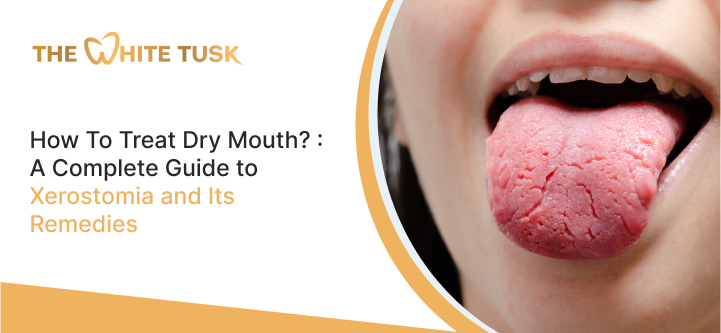
Dry mouth, also known as xerostomia, occurs when the salivary glands in the mouth do not produce enough saliva to keep the mouth moist. While it may seem simple, dry mouth can significantly impact oral health, so addressing it as soon as possible is important. In this comprehensive guide, we’ll explore the causes, symptoms, and effective treatments for dry mouth, offering solutions to help you manage this condition.
Dry mouth, or xerostomia, is the sensation of insufficient saliva. Saliva is essential for maintaining oral health because it helps with digestion, keeps the mouth moist, prevents tooth decay, and protects soft tissues. When there is not enough saliva production, it can lead to discomfort and various oral health problems.
The signs of dry mouth can range from mild to intense. Recognizing them early is key to seeking appropriate treatment. Common symptoms include:
If you frequently notice any of these symptoms, it’s important to reach out to a healthcare provider.
A dry mouth can lead to various negative impacts on oral health. Here’s how it can affect your overall health and happiness:
Saliva is critical in neutralizing acids in the mouth and washing away food particles and bacteria; without enough saliva, plaque buildup increases, leading to a higher risk of cavities and tooth decay.
Saliva helps protect your gums by flushing away bacteria. A lack of saliva allows bacteria to thrive, leading to gum disease (gingivitis or periodontitis) and discomfort in the gums.
A dry mouth makes chewing and swallowing food challenging, which can interfere with eating habits. It can also cause speech difficulties, especially when talking for long periods.
The absence of saliva can increase the number of bacteria and food particles in the mouth, causing persistent bad breath.
Saliva contains enzymes and antimicrobial agents that help prevent infections in the mouth. A dry mouth leaves the mouth vulnerable to fungal infections like thrush.
Luckily, there are numerous ways to manage and treat dry mouth. Depending on the underlying cause, these solutions can help restore moisture to your mouth and alleviate the discomfort associated with xerostomia.
One of the easiest and most effective ways to combat dry mouth is to drink plenty of water throughout the day. This keeps the body hydrated, supports healthy saliva production, and helps rinse away food particles and bacteria.
Tip: Always have a water bottle with you and drink a little bit of water regularly during the day.
Over-the-counter moisturizing mouth sprays and gels are specifically designed to relieve dry mouth. These products provide temporary relief by moisturizing the mouth and stimulating saliva production.
Chewing sugar-free gum or sucking on sugar-free lozenges stimulates the salivary glands and increases saliva production. Look for gums containing xylitol, as it can help improve oral health.
Tip: Opt for flavors like mint or lemon, which can increase saliva flow.
Good oral hygiene is essential in preventing the complications of dry mouth, such as tooth decay and gum disease. Make sure to brush your teeth a minimum of two times each day with fluoride toothpaste, floss once a day, and utilize an antimicrobial mouthwash. Think about using toothpaste and mouthwash designed specifically for dry mouth.
Tip: Use a soft-bristled toothbrush to avoid irritation if your mouth is sensitive.
Caffeine and alcoholic drinks can lead to dehydration and exacerbate dry mouth issues. Reducing your consumption of coffee, tea, and alcohol can aid in controlling dry mouth.
If you suffer from dry mouth at night, using a humidifier in your bedroom can help keep the air moist and prevent your mouth from drying out during sleep.
Smoking or using tobacco products can exacerbate dry mouth and reduce saliva production. Quitting smoking can improve your oral health and help alleviate dry mouth symptoms.
While treating dry mouth is essential, prevention is equally important. Here are a few steps to help maintain optimal saliva production and avoid xerostomia:
While dry mouth can often be managed with lifestyle changes, seeking medical advice is essential if the condition persists or worsens. A healthcare provider can help identify the root cause and recommend treatments. Persistent dry mouth could also signal an underlying health condition, such as autoimmune diseases or diabetes, requiring medical intervention.
Dry mouth is more than just a nuisance; it can seriously impact oral health and quality of life. By understanding the causes and symptoms of xerostomia, you can take proactive steps to manage the condition and protect your oral health. Hydration, oral hygiene, and moisturizing products can all play a vital role in alleviating the discomfort caused by dry mouth. Always seek advice from a healthcare professional if symptoms continue or get worse.
Remember, managing dry mouth involves more than treatment: prevention, lifestyle adjustments, and staying informed about your oral health.